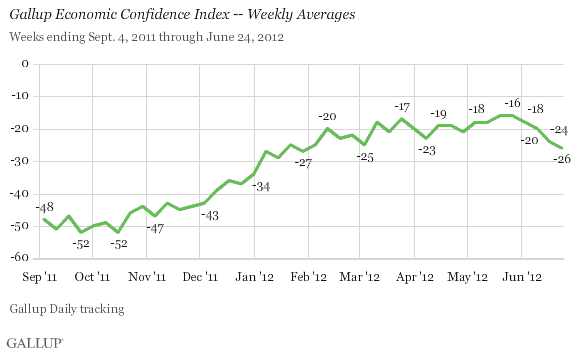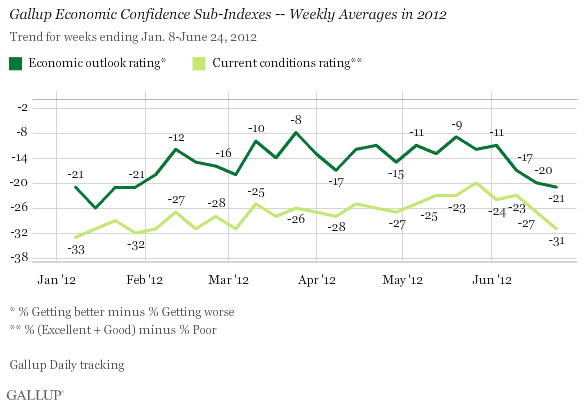WASHINGTON, D.C. -- Gallup's Economic Confidence Index was -26 for the week ending June 24, down slightly from -24 the week before. Americans' confidence has now receded for four straight weeks, and is at the lowest point since late January.

U.S. economic confidence last week was hardest hit June 19-21, when it fell to -28, but it bounced back to -25 over the weekend. The midweek slide may have resulted from the anticipated Moody's downgrade of several major banks and one of the worst trading days of the year on Thursday. However, the market rallied back on Friday, which may have led to the weekend improvement in confidence.
Gallup's Economic Confidence Index consists of two measures -- one assessing current economic conditions and the other assessing the nation's economic outlook. Americans' perceptions of current economic conditions worsened to -31, down four from the previous week, with 44% saying the economy is poor and 13% saying it is excellent or good. Attitudes about the economic outlook were down marginally last week, at -21.

Bottom Line
A disappointing May jobs report combined with the tepid economic climate in Europe and downgrading of major U.S. banks appear to have given U.S. consumers cause for concern in June. It will be interesting to see how the last week of June wraps up. There may be reason for optimism, with Gallup's U.S. unemployment rate having reached its lowest number in over two years. In the coming weeks, a decline in the Bureau of Labor Statistics' U.S. unemployment number for June could help improve confidence, as could falling gas prices, which immediately affect the pocketbooks of Americans, if the price declines continue as expected.
Gallup.com reports results from these indexes in daily, weekly, and monthly averages and in Gallup.com stories. Complete trend data are always available to view and export in the following charts:
Daily: Employment, Economic Confidence, Job Creation, Consumer Spending
Weekly: Employment, Economic Confidence, Job Creation, Consumer Spending
Read more about Gallup's economic measures.
View our economic release schedule.
Survey Methods
Results are based on telephone interviews conducted as part of Gallup Daily tracking from June 18-24, 2012, with a random sample of 3,323 adults, aged 18 and older, living in all 50 U.S. states and the District of Columbia, selected using random-digit-dial sampling.
For results based on the total sample of national adults, one can say with 95% confidence that the maximum margin of sampling error is ±2 percentage points.
Interviews are conducted with respondents on landline telephones and cellular phones, with interviews conducted in Spanish for respondents who are primarily Spanish-speaking. Each sample includes a minimum quota of 400 cell phone respondents and 600 landline respondents per 1,000 national adults, with additional minimum quotas among landline respondents by region. Landline telephone numbers are chosen at random among listed telephone numbers. Cell phone numbers are selected using random-digit-dial methods. Landline respondents are chosen at random within each household on the basis of which member had the most recent birthday.
Samples are weighted by gender, age, race, Hispanic ethnicity, education, region, adults in the household, and phone status (cell phone only/landline only/both, cell phone mostly, and having an unlisted landline number). Demographic weighting targets are based on the March 2011 Current Population Survey figures for the aged 18 and older non-institutionalized population living in U.S. telephone households. All reported margins of sampling error include the computed design effects for weighting and sample design.
In addition to sampling error, question wording and practical difficulties in conducting surveys can introduce error or bias into the findings of public opinion polls.
For more details on Gallup's polling methodology, visit www.gallup.com.
